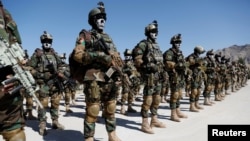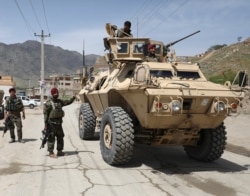Afghanistan’s security forces have suffered their bloodiest week so far in the 19-year-old Afghan war.
The Afghanistan's National Security Council said 291 members of Afghan National and Defense Security Forces (ANDSF) were killed and 550 others wounded in multiple Taliban attacks last week.
“Taliban carried out 422 attacks in 32 provinces, martyring 291 ANDSF members and wounding 550 others. Taliban's commitment to reduce violence is meaningless, and their actions inconsistent with their rhetoric on peace,” tweeted Javid Faisal, a spokesman for the NSC.
The NSC statement also said that at least 42 civilians, including women and children, were killed and 105 others were wounded in the violence Taliban committed across 18 provinces in the past week.
The statement comes at a time when hopes are high for the start of intra-Afghan negotiations, a term used for negotiations between the Taliban and a representative group of other Afghans including the government, political factions, and civil society activists.
“We haven’t seen the reduction in violence that we expect and that we think is necessary to really underpin the peace efforts, but we call on the Taliban to reduce violence. We call of course on Taliban to, in a constructive way, engage in intra-Afghan negotiations,” said NATO Secretary-General Jens Stoltenberg last week, following a meeting with NATO defense ministers.
On Sunday, the head of United Nations Assistance Mission in Afghanistan, Deborah Lyons, met Mullah Abdul Ghani Baradar, head of the Taliban political team in Doha.
“The UN envoy for #Afghanistan highlighted the need for a just peace that was inclusive of all Afghans, including women, youth and minorities,” a Tweet from the official UNAMA account said.
According to Afghanistan’s Tolo news, the Afghan negotiation team in Kabul has already started consulting with lawmakers. Tolo’s website quoted team member Nader Nadery as saying one of their main demands would be to “preserve the [government] system and its main pillars, like the national army and the national police.”
The two sides were scheduled to sit together on March 10, ten days after the Talban signed a deal with the United States to work toward peace in Afghanistan. The deal required the U.S. to announce a timeline for the withdrawal of its forces from the country, which it did.
The first phase of that withdrawal is already complete. The U.S. troop level is already down to 8,600 from around 12,000, according to General Frank McKenzie who leads the Central Command.
However, an increase in attacks from the Taliban, as well as a reluctance on the part of President Ashraf Ghani’s government to release 5,000 Taliban prisoners, as stipulated in the deal, hindered the start of the intra-Afghan negotiations.
The international community’s efforts to resolve both issues seems to be bearing fruit. The first round of the negotiation is expected at the end of this month in Doha, although the coronavirus pandemic has created another logistical hurdle.






